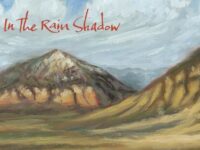Rogério Boccato is from São Paulo but he’s made his mark as a drummer and percussionist since arriving in New York in 2005, having performed with luminaries like Fred Hersch, Maria Schneider, Kenny Garrett and John Patitucci. He got our attention earlier this year with a fine performance in support of Caroline Davis’ admirable Heart Tonic album.
Now, though, Boccato is ready to step forward from being a notable sideman to a notable leader. No Old Rain is his debut, which finds him heading up a quartet with Dan Blake (saxes), Nando Michelin (Fender Rhodes) and Jay Anderson (bass). Calling this band “Rogério Boccato Quarteto” instead of the “Rogério Boccato Quartet” serves notice that this is Brazilian jazz music and No Old Rain is a very good celebration of that music.
Boccato didn’t write any of the songs here. Instead, he drew from the wealth of compositions from some of the great Brazilian songwriters like Milton Nascimento, Egberto Gismonti, Edu Lobo and Toninho Horta. By letting these harmonies just float on their own and exploiting the organic glow of Michelin’s Rhodes, this would have been a classic Brazilian fusion album had it been made in the early 70s, and in many ways it resembles Return To Forever, Mk. 1 — the one with Stanley Clarke, Joe Farrell, Airto Moreira and Flora Purim — but without Purim’s vocals.
Even more so than early RTF, the Quarteto is very loose and improvisational-minded, losing nothing in the way of melodicism. These guys just play and let the spirit of the moment take over.
Boccato was apparently so keen on not interfering with a good vibe, he chose to play the first three tunes as a single, continuous take, controlling the ebb and flow from behind his kit while his mates frolic within a wide perimeter of the song. After rendering the melody in a casual, roundabout way that emphasizes impressionistic sonic splotches, Quarteto locates a groove and “Cais” achieves liftoff while maintaining its free spirit. Blake keeps soloing right into the next song, “Clube Da Esquina No. 2.” Once again, the quartet takes its time, easing its into the song’s theme, — Blake’s tenor sax toying playfully with the bright melody — and then as Boccato hits on his snare harder, Blake takes the cue and plays with some stridency.
Another trio of songs is fashioned effectively into a three-part suite. Anderson’s presence can be felt throughout the entire sessions but for “Bicycle Ride,” he’s placed in a more prominent role, setting the initial parameters of the song. There’s a buildup that takes hold around him but he remains steadfast in his motif until it changes near the end. Out of the calm that follows that release comes “Bianca,” a light breeze that serves as a segue into “Cravo E Canela,” where a gracious interaction between Blake and Michelin is strongly supported by divine percussion from Boccato and Blake capping it off with an impassioned, high pitched crescendo.
The four engage in animated coaction to begin “Tango,” and come softly back to the ground. When Blake picks up the soprano sax, a different kind of warmth ensues; he’s really effective at exploring the upper ranges, sounding like Wayne Shorter in spots. Blake back on soprano evokes Shorter again during “Canto Triste,” but sounds just as graceful when he returns to tenor for “Pedra Da Lua.” That performance continues uninterrupted into “Viver de Amor,” which begins pensively before the four settle into the song effortlessly.
No Old Rain is now available, courtesy of Red Piano Records.
- Soft Machine – ‘Drop’ (1971, 2025 remaster) - May 21, 2025
- Marshall Allen’s Ghost Horizons – ‘Live In Philadelphia’ (2025) - May 19, 2025
- Satoko Fujii This Is It! – ‘Message’ (2025) - May 14, 2025



